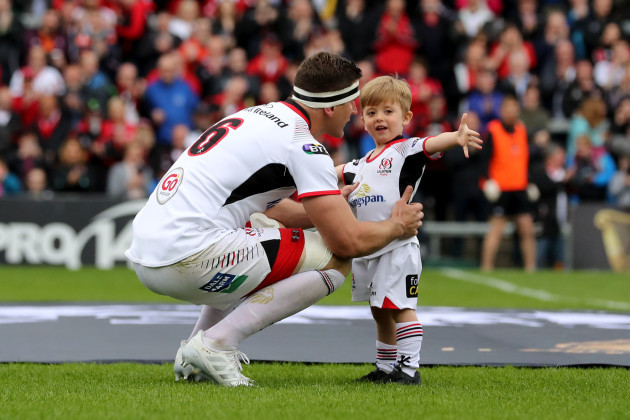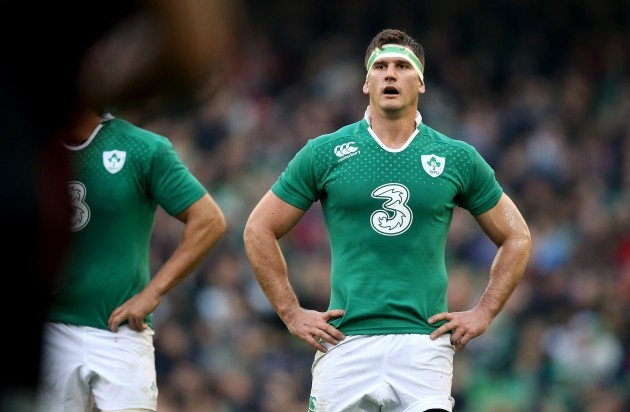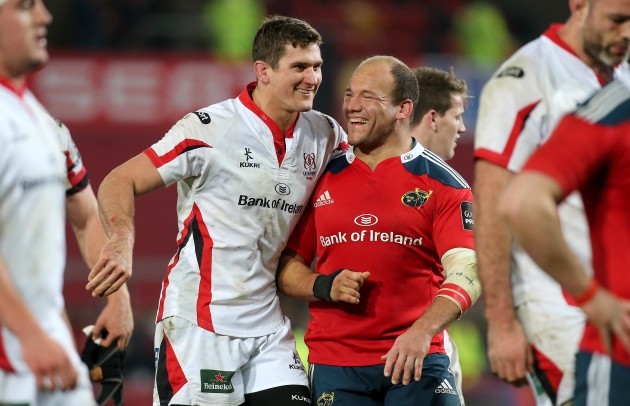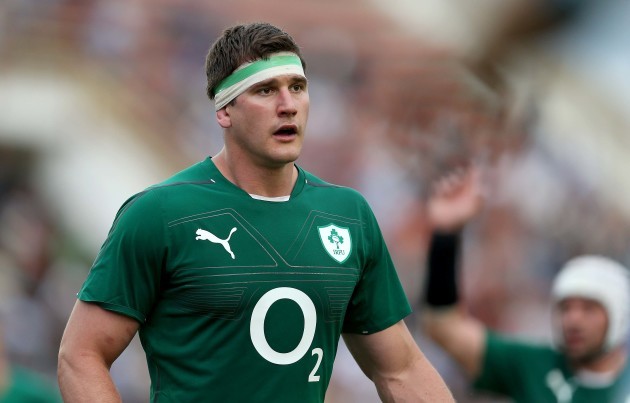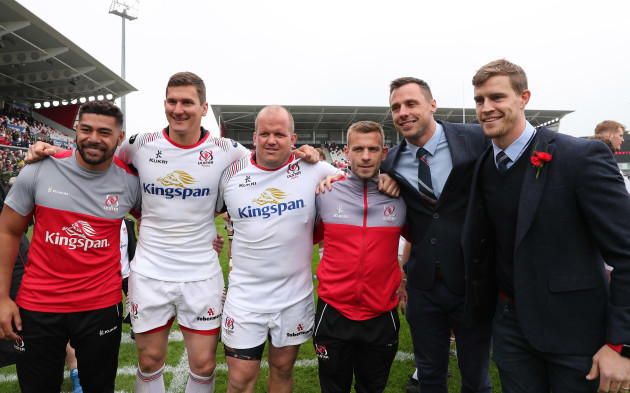THE STORMERS WERE on tour in Australia in 2008 when Robbie Diack got the first offer from Ulster.
Still just 22 and in his second season in Super Rugby, the promising South African back row had ambitions of playing for the Springboks and there had been some talk in the media about a possible call-up in the future.
So a move abroad wasn’t on the radar when Diack’s agent got in touch to relay the offer.
“I had no clue where Ulster was,” recalls Diack, who ended up playing for the northern province for 10 years, as well as winning two Ireland caps.
“I had a look and did some sums to work out the exchange rate to see what the contract offer was in Rand.”
Diack decided to keep chasing his Boks dream but Ulster were persistent. He arrived home from Australia to an improved offer, with a three-year contract opening up the possibility of qualifying for Ireland under the old residency rule.
Diack spoke to his family and one of his Stormers coaches, Gary Gold, who is now in charge of the US national team. Contact was made with Boks camp and Diack was told he probably wouldn’t get an opportunity because of the country’s back row depth.
Diack is honest about how he reached his final decision, underlining that he wanted to make the most of his career in a financial sense.
“That was one of the biggest factors for me going over to Ireland,” says Diack. “My salary jumped up four-and-a-half times from what it was in South Africa.
“I also had the opportunity to play for Ireland, so when you take those things into consideration, I was really pleased I made the decision so young in my career.
“It also enabled me, my wife, and my son to get British passports as well. As a South African, to have that exit clause is a great relief and something you can’t really put a price on.
“I remember Gary Gold was fantastic. He said it would be silly for me to miss out on an opportunity like this from a financial perspective.”
Diack returned home to South Africa after retiring in 2018 and is now working in real estate in the town of Hilton, just over an hour’s drive inland from Durban, where business has understandably slowed amidst the global lockdown.
“In South Africa, a lot of people live in gated estates just for security,” says 34-year-old Johannesburg native Diack of his new career.
“We specialise in getting people into those gated estates. They give people a sense of community and a sense of safety, just with the crime situation in South Africa.”
That situation meant many of friends raised their eyebrows when Diack and his wife, Kirsty, decided to return after a decade in Belfast – where their four-year-old son, Fletcher, was born.
“People asked us if we were serious because everyone is sort of trying to find their way out of South Africa, looking for employment elsewhere.
“We never left South Africa in 2008 because we wanted to get out, we left purely from a financial reason. We always wanted to come back to South Africa and give our little boy a chance to experience it. If it doesn’t work out, at least we’ve given it a shot.”
Diack is now coaching at his old secondary school, Michaelhouse, just up the road from where the family’s new house is being built.
He had vowed not to coach professionally when he was playing, having seen “how ruthless the environment is and how it can destroy families” but he couldn’t resist the lure of returning to his roots and is coaching alongside former Edinburgh out-half Carl Bezuidenhout, a teacher in the school.
Diack is now seeing up close how many young South African players are looking abroad earlier than ever before.
There are already a large number of South African youngsters in French clubs’ academies, Edinburgh have just signed a youngster straight out of school, while Munster’s Keynan Knox qualifies to play for Ireland at the end of this year.
“I am seeing it and even a few people have been in touch with me recently looking for contacts overseas and wondering how young schoolboys could get into academies in Ireland,” says Diack.
“People look at the Irish set-up in the four provinces as something to strive towards. First of all, it’s a financial decision. Rugby is a limited career and you want to play at the highest level, but there’s also the financial element to it. You want to try and make the most of it.”
Diack feels he did that with his career, becoming the sixth most-capped player in Ulster’s history with his 205 appearances, although he would have loved to have had more opportunities with Ireland.
He remembers arriving on his own initially in 2008, moving in with Chris Henry until finding his own place, with Kirsty soon following and they settled into life in Belfast, buying a house that they still rent out today.
On the rugby front, Diack established himself as an important part of the Ulster squad.
“Unfortunately, we never won anything. We got close, which was so frustrating. I arrived with BJ Botha in 2008 and we finished those first two seasons in eighth place [in the Celtic League]. We were thinking, ‘What are we doing?’ and it was quite a low point.
“But then to see how much that changed and the players Ulster recruited – guys like John Afoa, Johann Muller, Ruan Pienaar, Tom Court – it was just incredible and we got to a Heineken Cup final and we were regularly in contention.
“From where we were to where we got to was amazing, but the fact that we never won anything was so disappointing and I always felt for Rory Best. We were all gutted but the fans were amazing, supporting us through thick and thin. It must have been frustrating for them but they always came back.”
Off the pitch, Diack spread his wings by importing cheeseboards from South Africa, part-owning a café, and even starting a wine business with Pienaar called Ballybosch.
Diack’s most enjoyable period in Ulster was under the coaching of Mark Anscombe from 2012 to 2014, with the Kiwi bringing out the best in him.
“He was the most relaxed with the way we played, gave us a lot of responsibility for how we trained and played, which made sense given our experience,” says Diack, who also highlights the influence of Ulster’s ex-head of athletic performance, Jonny Davis.
Having been Irish-qualified since 2011, Diack’s good form under Anscombe resulted in him coming onto Ireland’s radar.
“It was never a guarantee with Ireland, it was more that carrot dangling there for me – the fact that I could represent Ireland after three years, but it helped with Ulster that I wasn’t a non-Irish player after that,” says Diack.
Having been part of Declan Kidney’s wider squad for the 2013 Six Nations, Diack played for Emerging Ireland in that year’s Tbilisi Cup and then became tied to Ireland when he featured for the Anthony Foley-coached Wolfhounds against the England Saxons in 2014.
His senior Test debut arrived in the summer of 2014 in the first Test of the tour to Argentina under Joe Schmidt, with Diack having an impressive game as Ireland won.
“I remember Joe named the team early in the week and it must have been the longest week of my life, thinking ‘You’ve got to get through these next few days without getting injured in training or getting food poisoning!’
“It was Paul O’Connell’s 100th Test match so to play with him and Johnny Sexton, to see what those guys could do when they’re on your team rather than playing against you, singing the national anthem, it was an amazing experience.”
Diack was disappointed to miss out on the second Test, though the changes had been planned well in advance, and he had to wait until November 2014 to feature for Ireland again, starting a win against Georgia.
He was 24th man for the games against South Africa and Australia that same month, then got promoted onto the bench during the 2015 Six Nations when Sean O’Brien was injured in the warm-up before a clash with Italy. But Diack didn’t play and he finished with two caps, although he did tog out for an Ireland XV against the Barbarians that year.
“I feel I could have got more than two caps to my name,” he reflects. “But the fact is I played international rugby, you’ve got to be positive about it – some people get stuck on one cap, so two is a bonus.”
In Ulster, Diack became more frustrated in his final season, with the province in a negative place as they battled scandal off the pitch and stuttering performances on it.
Diack still had a year left on his contract but felt he might be better moving on as Ulster looked at beginning a rebuild in the 2018/19 season.
“I didn’t want to be the guy bringing the team down, I would rather finish on a positive note. I spoke to my agent, I said that if there was a pay-off opportunity, I would look at it.
“There was some umming and awwing, so I went to Bryn Cunningham [Ulster's operations director] and had a frank conversation with him. He said they’d be happy to pay me out and it worked out very well.
“There was no bad feeling whatsoever and I started that last game of the season, the Heineken Cup qualifier against the Ospreys and we made it into Europe. I ran out with my little boy at the Kingspan and it gave me great closure.”
Diack was initially keen on a move to Japan but, even with his body feeling capable of playing on, he realised that “there’s a time where you have to make that decision to get involved in the real world.”
He reflects on some amazing highs in his rugby career but when he’s asked if he would encourage his son to pursue it in years to come, Diack also warns of the lows that can come due to injury, missing out on selection, and criticism.
“My wife saw me at some low points in dealing with certain coaches who gave you mixed message.
“You could also read articles saying you’re useless. You could get a 2/10 in the ratings and people would say ‘Why have we signed this guy for two more years? He shouldn’t be playing’. People tell you not to read it, but it’s difficult when it’s all around you. That kind of thing can hurt.”
Diack explains that the transition out of the game is difficult and he regrets not getting more work experience outside of the sport while he was still playing.
“In rugby, you can think you’ve got a bit of a name and a profile maybe, but that’s only going to last for so long. You can’t live off that profile forever, you’ve got to go out and make it work.
“I’ve got stuck in and tried to find my feet. It’s been difficult coming from a good salary, a constant salary. You do miss the financial security from rugby and I’ve found that difficult.
“With this job I’m doing now, it’s commission-based so it’s harder to budget and plan, but we’re getting there and making positive steps forward. I love food and coffee, so I’d love to get involved in something like that down the line as well.
“It’s amazing being back in South Africa and especially for my little boy being around our family and, normally, being able to get out and about with the climate here.
“But we’d love to go back to Belfast some time to see people we miss and just be fans at Kingspan Stadium.”
